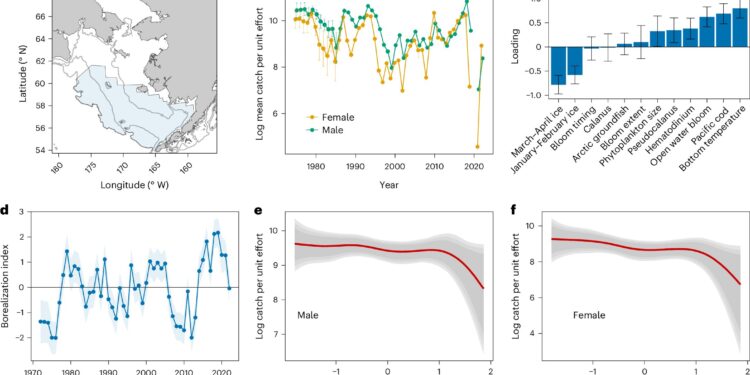The collapse of snow crab in the context of Bering Sea borealization. Credit: Nature Climate change (2024). DOI: 10.1038/s41558-024-02093-0
A team of marine biologists from the U.S. National Oceanic and Atmospheric Administration has discovered that climate change is the reason for the collapse of the Alaskan snow crab population in the Bering Sea.
In their study, published in Nature Climate changeThe group conducted analyses of ice cover, sea-floor temperatures, algal bloom levels under sea ice, and Arctic community composition over the years 1972 to 2022.
Previous research has shown that the number of snow crabs in the Bering Sea has declined significantly in recent years, with some estimates suggesting that the population dropped by 10 billion between 2018 and 2021. In the new study, the research team found enough evidence to blame climate change with 98 percent confidence.
By studying temperature, ice cover and algae populations, particularly on the sea floor, the researchers found that temperature changes have made it much harder for young crabs to survive to adulthood. Before the warming, research had shown that young crabs were able to survive because they lived in waters so cold that predators couldn’t reach them. Temperatures this cold have been observed in cold pools on the sea floor.
But in recent decades, temperatures in these basins have risen to the point where predators are now free to attack. The researchers note that the massive decline in snow crab populations has coincided with marine heat waves in the region, which are linked to climate change. They also noted that Pacific cod populations have increased during the same period, which are the fish that are the primary predators of young snow crabs.
The research team also found that cases of bitter crab disease, which can be potentially fatal, increased in the region during the same period, which, they note, tends to occur during warm periods.
They conclude that the crabs are not being boiled alive by high ocean temperatures, as some have claimed, but are victims of circumstances caused by rising seawater temperatures, particularly at shallower depths – and that things are likely to get worse for the crabs as ocean temperatures rise further.
More information:
Michael A. Litzow et al., Human-induced borealization drives collapse of Bering Sea snow crab, Nature Climate change (2024). DOI: 10.1038/s41558-024-02093-0
© 2024 Science X Network
Quote:New study shows collapse of Alaska snow crab population in Bering Sea due to climate change (2024, August 26) retrieved August 26, 2024 from
This document is subject to copyright. Apart from any fair dealing for the purpose of private study or research, no part may be reproduced without written permission. The content is provided for informational purposes only.



